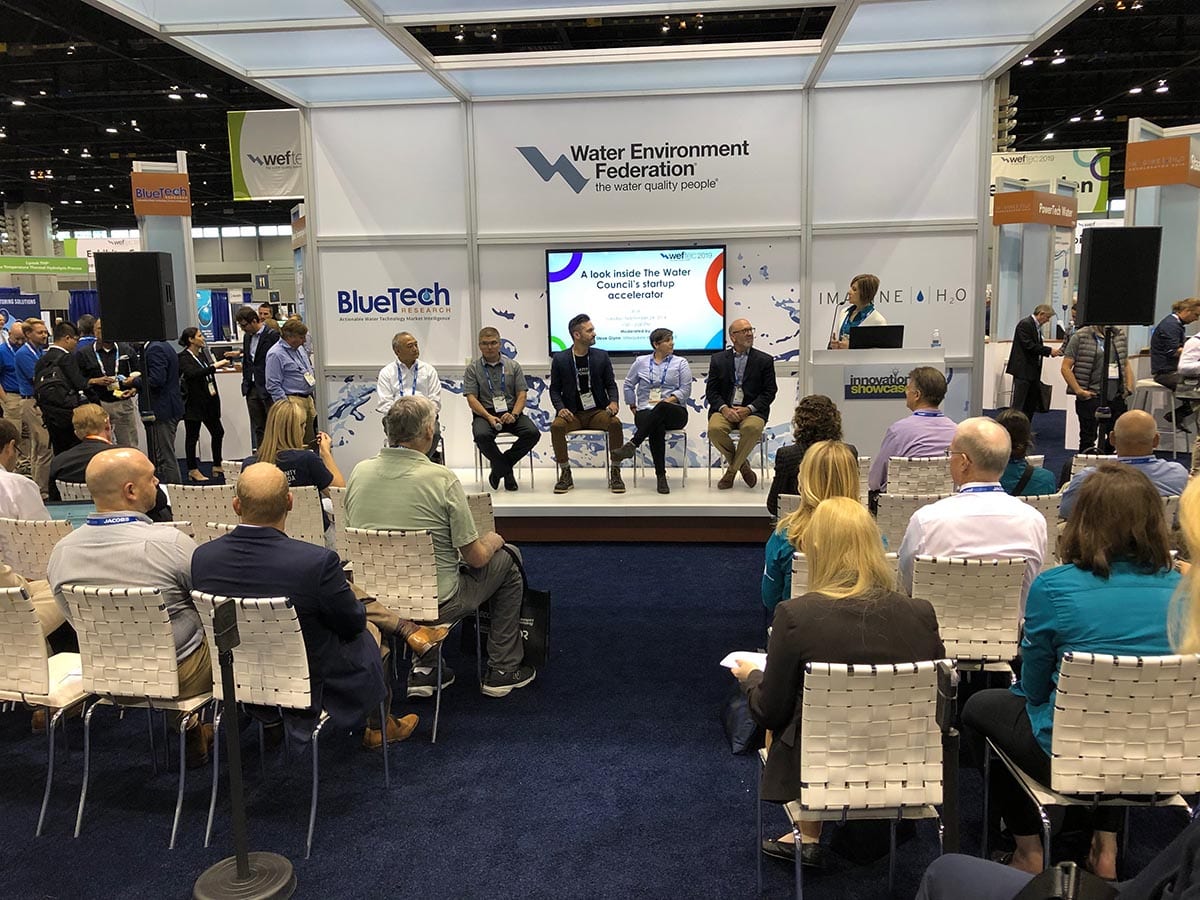
Mark Karstedt of PlasmaE, Nisha Sarveswaran of Ecoli-Sense, Charles Otis of Pulse Burst Systems and Dennis Busch of Water Resources Monitoring Group present at the BREW Tank session, moderated by Bill Dougan, BREW Accelerator coach and entrepreneurship professor at the University of Wisconsin-Whitewater.
Innovations taking place in water technology have the potential to make an impact in a wide range of areas, from cleaning up our waterways and drinking water sources to saving energy and even saving lives.
Four startups showcased their technologies’ transformative potential at the “BREW Tank” session today at the Water Environment Federation’s Annual Technical Exhibition and Conference (WEFTEC) in Chicago. The companies are participants in this year’s class of The Water Council’s BREW (Business. Research. Entrepreneurship. In Wisconsin) Accelerator.
Ecoli-Sense CEO Nisha Sarveswaran presented about her company’s hand-held, portable sensor used to detect the presence of E. coli bacteria in liquids. She said the sensor, which utilizes e-ink, could have applications for food safety as well as environmental testing, such as at public beaches.
Dennis Busch of Water Resources Monitoring Group spoke about his company’s systems for monitoring agricultural runoff, which provide enhanced monitoring at much lower cost than traditional systems. The systems monitor soil moisture, drainage, runoff, rainfall, irrigation and evaporation, thus enabling farmers to make better-informed decisions, maximize yield and use water more efficiently—and they allow for monitoring the runoff that leaves a farmer’s property, thus supporting efforts to reduce the impact of agricultural runoff on nearby waterways.
Charles Otis, chief operating officer of Pulsed Burst Systems, described how his company harnessed the power of giant bubbles to create blowers that use the physical properties of air and water to circulate water. The company’s MegaBubble devices generate much less turbulence than mixing water than the fine bubble aerators that are widely used in wastewater treatment plants.
Improving the efficiency of wastewater treatment is also the focus of PlasmaE, whose vice president of sales, marketing and operations, Mark Karstedt, presented at the BREW Tank event. PlasmaE uses static electricity to make “sticky air,” Karstedt said—to increase the solubility of oxygen so more of it dissolves into the water during the wastewater aeration process, speeding the treatment process and making it more efficient since less oxygen is released into the air.
Three of the four companies that took part in the session got their start in Wisconsin (all but Ecoli-Sense, which was founded in Toronto).
As part of the BREW Accelerator, companies move to Milwaukee for one year. They receive office space in the Global Water Center, where they benefit from networking with other companies and researchers in the building and in Milwaukee’s water cluster. Each BREW participant also receives up to a $50,000 equity investment, business training through the University of Wisconsin-Whitewater Institute for Water Business, among other benefits.
The BREW Tank was a Shark Tank-style session, with each entrepreneur given a few minutes to succinctly present his or her idea, followed by questions asked by industry expert “judges” to further explore each idea’s market potential.
Check back on the Wisconsin Economic Development Corporation Events Blog later this week for more coverage of Wisconsin’s presence at WEFTEC.






